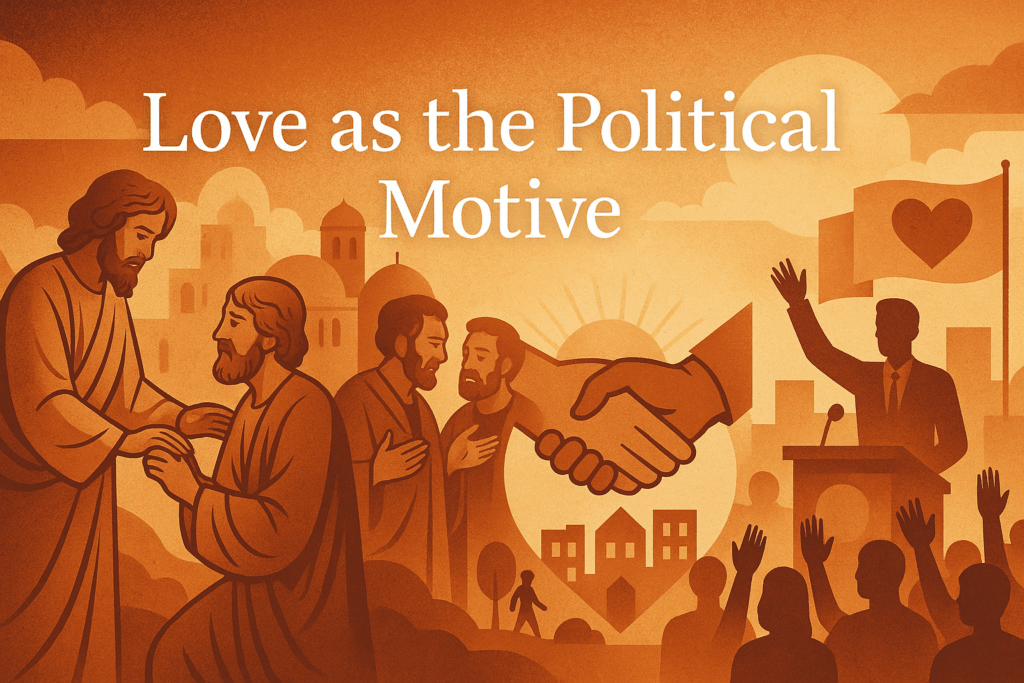At the summit of Paul’s ethical vision stands love—agape—as the supreme ordering principle for life in community. In contrast to the ancient world’s obsession with honor, power, and legal obligation, Paul taught that love alone fulfills the law and secures true justice. This paradigm not only shaped Christian theology but also provided the moral foundation for the modern world’s deepest commitments to compassion, justice, and universal human rights. By elevating love from private affection to the political motive of society, Paul offered a vision that continues to sustain civilization itself.

The Scriptural Witness
Paul’s celebrated hymn to love in 1 Corinthians 13:1–13 articulates its supremacy: “Though I speak with the tongues of men and of angels, and have not charity, I am become as sounding brass, or a tinkling cymbal… And now abideth faith, hope, charity, these three; but the greatest of these is charity.” Here Paul declares that all gifts—eloquence, prophecy, knowledge, even faith—are meaningless without love. Love is not a peripheral virtue but the very essence of the Christian life. By insisting that love is greater than faith and hope, Paul makes it the supreme principle by which all other actions are measured.
Paul draws out the political implications of love in Romans 13:8–10: “Owe no man any thing, but to love one another: for he that loveth another hath fulfilled the law. For this, Thou shalt not commit adultery, Thou shalt not kill, Thou shalt not steal, Thou shalt not bear false witness, Thou shalt not covet; and if there be any other commandment, it is briefly comprehended in this saying, namely, Thou shalt love thy neighbour as thyself. Love worketh no ill to his neighbour: therefore love is the fulfilling of the law.” Love here is not mere sentiment but the operative principle of justice. Every commandment finds its fulfillment in love, which prevents harm and promotes the good of others. In this way, Paul defines love as the true political motive—the basis for law, order, and social harmony.
The Pauline Paradigm and Modern Ethics
Paul’s elevation of love as the supreme virtue transformed moral thought. In the Greco-Roman world, politics was built on power and law was enforced by fear. Paul offered a radically different foundation: law is fulfilled not by coercion but by love. This paradigm shifted the moral axis of civilization. Love became the principle that restrains selfishness, directs freedom toward the common good, and secures justice in human community.
This principle profoundly influenced Western ethics. Augustine’s maxim, “Love, and do what you will,” echoes Paul’s conviction that love alone ensures true morality. Thomas Aquinas would later call charity the form of all virtues. The modern insistence that laws must serve justice, that governments exist for the good of the people, and that compassion is integral to politics all descend from Paul’s vision of love as the ordering principle.
Moreover, Paul’s ethic of love inspired countless social movements. Abolitionists, civil rights leaders, and humanitarians have drawn from this Pauline conviction that love is not weakness but the strongest political force. Martin Luther King Jr. famously described love as the only power capable of transforming enemies into friends—a thoroughly Pauline ethic.
In secular ethics, love’s legacy persists in the principles of empathy, solidarity, and human rights. When international charters affirm the dignity of every person, when democratic societies insist on equality, they are translating Paul’s vision of love into political structures. Love, once a theological virtue, has become the hidden foundation of modern civilization.
Why It Matters Today
In a fractured world marked by division, hostility, and suspicion, Paul’s paradigm of love as the political motive is more urgent than ever. Political systems that rest on fear, coercion, or self-interest cannot endure. Only love—the commitment to seek the good of the neighbor—can secure true peace and justice. Paul’s vision challenges us to measure politics not by wealth, power, or efficiency but by love’s standard: does this policy promote the good of others? Does it protect the vulnerable? Does it build community rather than division?
Modern secular ethics—whether in human rights law, democratic governance, or humanitarian aid—owe their foundation to Paul’s proclamation that love is the fulfillment of the law. To forget this heritage is to risk reducing politics to power struggles and law to lifeless regulation. Love alone secures the dignity of all.
Paul’s hymn still resounds: “The greatest of these is love.” This is not only the apex of Christian faith but the bedrock of modern civilization. Love, as Paul proclaimed, is the true political motive—the power that orders society, sustains justice, and secures the future of humanity.
